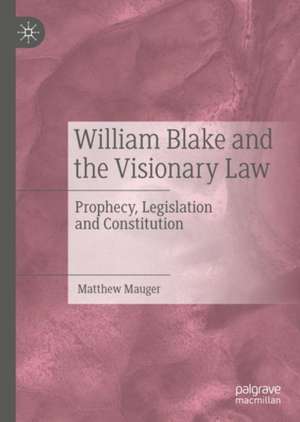William Blake and the Visionary Law: Prophecy, Legislation and Constitution
Autor Matthew Maugeren Limba Engleză Hardback – 14 sep 2023
Preț: 697.97 lei
Preț vechi: 821.14 lei
-15% Nou
Puncte Express: 1047
Preț estimativ în valută:
133.57€ • 139.28$ • 111.01£
133.57€ • 139.28$ • 111.01£
Carte tipărită la comandă
Livrare economică 20 martie-03 aprilie
Preluare comenzi: 021 569.72.76
Specificații
ISBN-13: 9783031377228
ISBN-10: 3031377222
Ilustrații: XIII, 231 p. 12 illus.
Dimensiuni: 148 x 210 mm
Greutate: 0.45 kg
Ediția:1st ed. 2023
Editura: Springer International Publishing
Colecția Palgrave Macmillan
Locul publicării:Cham, Switzerland
ISBN-10: 3031377222
Ilustrații: XIII, 231 p. 12 illus.
Dimensiuni: 148 x 210 mm
Greutate: 0.45 kg
Ediția:1st ed. 2023
Editura: Springer International Publishing
Colecția Palgrave Macmillan
Locul publicării:Cham, Switzerland
Cuprins
1 – Introduction.- 2 – Laws Ancient and Modern: Nation, Custom and Legislative Renewal.- 3 – One Law for the Lion and the Ox is Oppression: the Emergence of Universal Law.- 4 – One King, One God, One Law: Building Constitutions in the Lambeth Books.- 5 – The Heavens Squared by a Line: Legal Architecture and Mystery.- 6 – Such are the Laws of Eternity: Recovery, Redemption, and Prophecy.- 7 – Creating Nature from this Fiery Law: Towards Visionary Legislation?.- 8 – Conclusion.
Notă biografică
Matthew Mauger is Senior Lecturer in English at Queen Mary University of London, UK. His research focuses on the intellectual, literary and commercial life of London in the eighteenth century, with a particular interest in how the administrative frameworks associated with the city – civil, legal, political, financial – provide contexts for literary expression. He is co-author of Stealing Books in Eighteenth-Century London (2016) and of Empire of Tea: The Asian Leaf that Conquered the World (2015).
Textul de pe ultima copertă
This book examines the difficult relationship between individual intellectual freedom and the legal structures which govern human societies in William Blake’s works, showing that this tension carries a political urgency that has not yet been recognised by scholars in the field. In doing so, it offers a new approach to Blake’s corpus that builds on the literary and cultural historical work of recent decades. Blake’s pronouncements about law may often sound biblical in tone; but this book argues that they directly address (and are informed by) eighteenth-century legal debates concerning the origin of the English common law, the autonomy of the judicature, the increasing legislative role of Parliament, and the emergence of the notions of constitutionalism and natural rights. Through a study of his illuminated books, manuscript works, notebook drafts and annotations, this study considers Blake’s understanding that law is both integral to humanity itself and a core component of its potential fulfilment of the ‘Human Form Divine’.
Matthew Mauger is Senior Lecturer in English at Queen Mary University of London, UK. His research focuses on the intellectual, literary and commercial life of London in the eighteenth century, with a particular interest in how the administrative frameworks associated with the city – civil, legal, political, financial – provide contexts for literary expression. He is co-author of Stealing Books in Eighteenth-Century London (2016) and of Empire of Tea: The Asian Leaf that Conquered the World (2015).
Caracteristici
Explores the relationship between individual intellectual freedom and legal structures as presented in Blake’s works Argues that Blake’s corpus directly addresses and is informed by eighteenth-century legal debates Examines his illuminated books, manuscript works, notebook drafts and annotations
